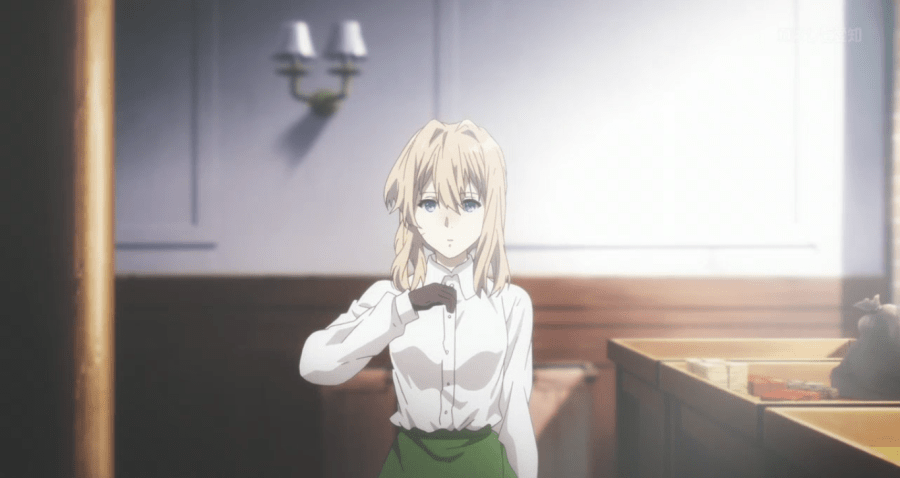There’s a moment in the first episode of Violet Evergarden when the eponymous character meets Benedict, a postal employee, and ever the soldier, begins to salute him. She quickly drops her arm to her side and bows instead, though, understanding either that Benedict is not a soldier or that she’s no longer in the army, or both.
Violet is damaged, hurt by physical injuries suffered during war, emotional injuries connected with Major Gilbert, and mental injuries incurred by years of army training. All those years of military work makes it tough for her to adjust to the civilian life she’s been given. In fact, she doesn’t want to adjust: the opening scene has Violet writing a letter asking for another mission, and throughout the episode she shows an unwillingness to move on from a soldier’s life.
Her response is very true to that of many soldiers that exit the armed forces, especially career soldiers. They’ve done things a certain way—not just with work, but in their lives as whole—for so long, that a transition to becoming a civilian is challenging. More than that, the sloppiness with which civilians often live their lives, without the attention to detail that, say, the Army provides, leads many retiring soldiers to reject society. They try to live a civilian life by military rules, and that ultimately cannot work.

I see this challenge often, in a small way, when looking through applications from individuals applying to work at my agency. Veterans always apply for our openings, and their submissions stand out. They write in Army speak, something I’m able to decipher as a child of a career soldier, but others might not. These veterans haven’t made necessary small adjustments, and as such I assume that many haven’t made the bigger ones. It takes time, after all. I saw my dad, a war veteran who retired as a 1SGT, slowly evolve over the years. He’d been in the armed forces since he was 17 years old, for well over half his life, so of course it would take time for him to adjust to being outside those familiar confines.
Going back to Violet, you could argue that in a variety of different ways, she’s also a prisoner. The prime characteristic that comes to mind is that prisoners notoriously have difficulties living on the straight and narrow after exiting jail. The Shawshank Redemption shows this well when the bird man of the penitentiary commits suicide after being outside of prison walls for a short amount of time. Red, played by Morgan Freeman, follows near the end of the movie; experiencing similar challenges, he considers his possibilities. We as the audience wonder, will he try to get back into prison? Will he run away? Or might he even choose the same ending as his friend, who lived in the very apartment he’s now in while on parole?
I’ve never been to prison nor have I served in the military—my life transitions haven’t been as dramatic as Violet’s. But I have had smaller, subtler transitions that I found challenging. Moving from high school to college was a strain, and from college to the work force even more so. Shifting from single life to married, and married to married with children were all challenging passages as well.
None of my transitions felt as cut and dry as Violet’s. They were, instead, part of the slow maturation process—at least that’s what they seemed. But I sometimes got lost in those transitions, just like Violet is lost right now, and I think for similar reasons. Not only had I lived a long time in a certain way before having to adjust, but for each of those transitions, I didn’t have a solid feel for who I was at the time. I now understand who I am, the good and bad, and can make job changes and other big shifts with confidence and readiness, but when I was Violet’s age, I had no idea what I was doing (and she must feel even more lost so based on her upbringing and material composition). I also didn’t have a plan in place—having a solid foundation to refer to when making transitions in my life would have certainly made a difference.
And that’s what I have to offer you, my advice from one who has moved through a number of different life stages a little too willy nilly. Maybe you’ll navigate them better than I did with a strong plan in place, and maybe you know who you are better than I did when I was your age. But even if you’re like Violet or me, don’t be afraid—the journey, after all, helps us learn who we are, all the better for the next transition we make in this series of them which we call life.
